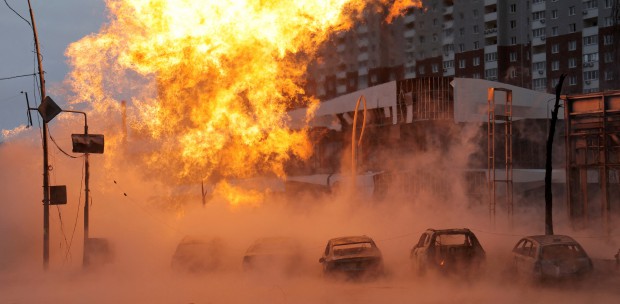Biden administration wants to start moving weapons and equipment into Ukraine within days of the anticipated passage this week of legislation that includes US$60 billion in military aid to Kyiv, a long-delayed lifeline for the embattled nation.
The aid would arrive much later than Ukraine — running low on ammunition and staggering under a renewed Russian onslaught — had hoped, and analysts caution that there is no guarantee that more will be forthcoming.
But officials and experts agree that the artillery rounds, precision-guided missiles and air defences will change the military outlook for Ukraine.
"With the boost that will come from military assistance, both practically and psychologically, the Ukrainians are entirely capable of holding their own through 2024 and puncturing Putin's arrogant view that time is on his side," CIA director William Burns said on Thursday at the Bush Centre Forum on Leadership in Dallas.
Ammunition, interceptors for air defence systems and long-range weapons can begin moving "within days" once the bills become law, said a US official.
More than two years into Russia's full-scale invasion, Ukraine has lost territory in the eastern part of the country and Russia has ramped up its bombardment of cities and towns behind the front lines amid a slowdown in Western military assistance.
Aid for Ukraine had been held up for months over objections from hard-right Republican lawmakers in the US House of Representatives.
On Saturday, the House passed a US$95 billion legislative package providing security assistance to Ukraine, Israel and Taiwan. It now heads to the Senate and passage is expected this week, clearing the way for President Joe Biden to sign it into law.
Over the weekend, Zelenskyyy welcomed the advancing of the aid package in the House of Representatives, and repeatedly urged lawmakers to swiftly pass the bill in the Senate so the transfer of weapons can happen quickly.
The Biden administration is finalising its next assistance package for Ukraine so it can announce the new tranche of aid soon after the bill becomes law to meet Ukraine's urgent battlefield needs, a White House official said.
COSTLY DELAY
The delay in approving new supplies has been costly for Kyiv.
"The aid is coming way too late, as material shortages resulted in Ukraine losing the initiative in October 2023," said Kateryna Stepanenko, a Russia analyst at the Institute for the Study of War.
Since October, Ukraine has lost 583sq km of territory to Russian forces, largely because of a lack of artillery, said Stepanenko, who added that Russia has had time to prepare for offensive operations expected in late spring or early summer.
But Ukraine's military should be able to put the munitions — especially ATACMS missiles, air defence interceptors and artillery shells — to use "almost immediately", said retired Vice Admiral Robert Murrett of the Institute for Security Policy and Law at Syracuse University.
Zelenskyyy has asked for ATACMS, long-range guided missiles that allow Ukraine to hit targets such Russian command posts and weapons depots in Crimea.
Senate Intelligence Committee Chair Mark Warner told CBS' Face the Nation on Sunday that military equipment, including the longer-range ATACMS, should be "in transit by the end of the week" providing Senate also passes the legislation.
Ukraine should also receive more missiles for the Patriot air defence system, which has proven effective against missile and drone attacks.
Riki Ellison, founder of the Missile Defense Advocacy Alliance, said US weapons makers had been ramping up production of missiles for the Patriot defence systems to meet demand and should be ready to ship missiles quickly.
POLITICAL UNCERTAINTY
Beyond 2024, however, uncertainties await Ukraine.
These include the possible reelection of former US president Donald Trump, who has voiced scepticism over large amounts of Ukraine aid and has questioned how fast the US and European defence industries can ramp up weapons production.
The former president and hardline Republicans in Congress oppose further aid to Ukraine, with the possible exception of a loan.
If signed into law the US package could have a powerful signalling effect, not just in terms of Ukrainian morale but for other US allies to contribute aid, said Jeffrey Pryce, international lawyer and senior fellow at the foreign policy institute at Johns Hopkins School of Advanced International Studies.
"If America goes first then other countries are much more comfortable adding to those supplies," Pryce said.
The writer is from Reuters
The views expressed in this article are the author's own and do not necessarily reflect those of the New Straits Times





